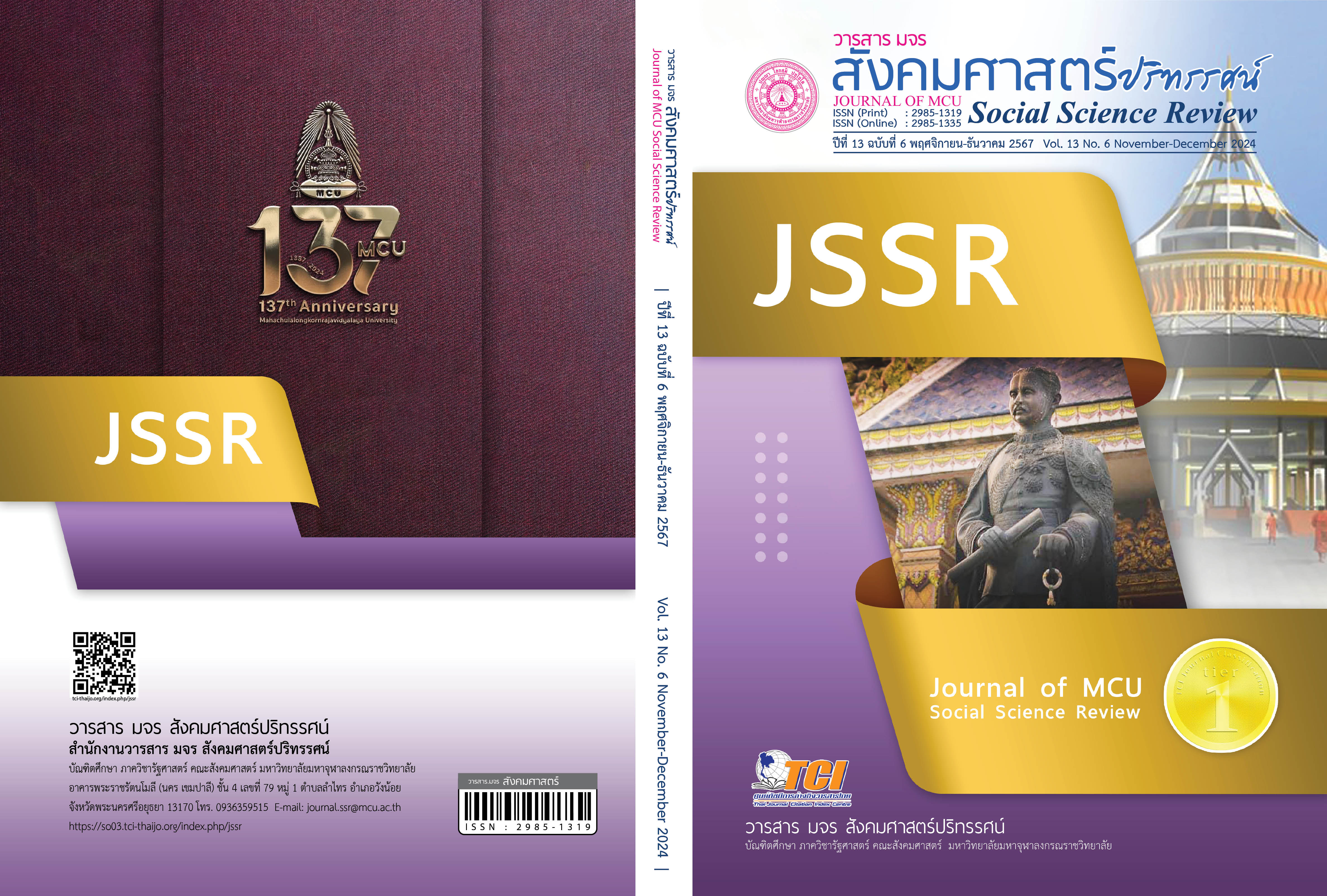รูปแบบการพัฒนาคุณภาพชีวิตผู้สูงอายุตามแนวพระพุทธศาสนาของกรุงเทพมหานคร
คำสำคัญ:
คุณภาพชีวิต, ผู้สูงอายุ, หลักภาวนา 4บทคัดย่อ
บทความวิจัยนี้มีวัตถุประสงค์ 1. ศึกษาคุณภาพชีวิตผู้สูงอายุของกรุงเทพมหานคร 2. ศึกษาปัจจัยที่ส่งผลต่อคุณภาพชีวิตผู้สูงอายุของกรุงเทพมหานคร และ 3. นำเสนอรูปแบบการพัฒนาคุณภาพชีวิตผู้สูงอายุตามแนวพระพุทธศาสนาของกรุงเทพมหานคร เป็นการวิจัยแบบผสานวิธี การวิจัยเชิงปริมาณใช้กลุ่มตัวอย่างจำนวน 400 คนจากประชากรทั้งหมด ค่าความเชื่อมั่นที่ 0.958 สถิติที่ใช้ในการวิเคราะห์ข้อมูลได้แก่ ค่าความถี่ ร้อยละ ค่าเฉลี่ย ค่าเบี่ยงเบนมาตรฐาน และการวิเคราะห์การถดถอยพหุคูณ ส่วนวิจัยเชิงคุณภาพดำเนินการโดยใช้แบบสัมภาษณ์เชิงลึกกับให้ข้อมูลสำคัญจำนวน 18 รูปหรือคน วิเคราะห์ข้อมูลด้วยการวิเคราะห์เนื้อหาเชิงพรรณนาและการสนทนากลุ่มเฉพาะผู้ส่งคุณวุฒิจำนวน 9 รูปหรือคน เพื่อยืนยันองค์ความรู้หลังการสังเคราะห์ข้อมูล
ผลการวิจัยพบว่า 1. คุณภาพชีวิตผู้สูงอายุของกรุงเทพมหานคร โดยภาพรวมอยู่ในระดับมาก เมื่อพิจารณาเป็นรายด้าน พบว่า อยู่ในระดับมากทุกด้าน ได้แก่ ด้านร่างกาย ด้านความสัมพันธ์ทางสังคม ด้านจิตใจ และด้านสิ่งแวดล้อม ตามลำดับ 2. ปัจจัยที่ส่งผล
ต่อคุณภาพชีวิตผู้สูงอายุของกรุงเทพมหานคร พบว่า นโยบายของรัฐต่อผู้สูงอายุที่ส่งผลต่อคุณภาพชีวิตผู้สูงอายุของกรุงเทพมหานคร 4 ด้าน อย่างมีนัยสำคัญทางสถิติที่ระดับ 0.01 เรียงลำดับ คือ หลักประกันด้านรายได้ การจัดสวัสดิการสังคมด้านสุขอนามัย ด้านสุขภาพ และการลดความเหลื่อมล้ำของสังคม ส่วนหลักภาวนา 4 ที่ส่งผลต่อคุณภาพชีวิตผู้สูงอายุของกรุงเทพมหานคร 4 ด้าน อย่างมีนัยสำคัญทางสถิติที่ระดับ 0.01 โดยเรียงลำดับความสำคัญในการคัดเลือกเข้าสมการ คือ กายภาวนา การพัฒนาด้านร่างกาย สีลภาวนา การพัฒนา
ด้านพฤติกรรม จิตภาวนา การพัฒนาด้านจิตใจ และปัญญาภาวนา การพัฒนาด้านปัญญา และ 3. รูปแบบการพัฒนาคุณภาพชีวิตผู้สูงอายุตามแนวพระพุทธศาสนาของกรุงเทพมหานคร พบว่า กายภาวนา การพัฒนาร่างกาย คือ การให้มีกิจกรรมการเคลื่อนไหวร่างกายเป็นนิจ จิตภาวนา การพัฒนาจิตใจ ให้มีการฝึกจิต โดยการฝึกสมาธิ สีลภาวนา พัฒนาพฤติกรรมในการอยู่ร่วมกันในสังคม และ ปัญญาภาวนา พัฒนาปัญญาเพื่อให้เหมาะสมกับการเปลี่ยนแปลงของยุคสมัยปัจจุบัน
เอกสารอ้างอิง
กรมการปกครอง. (2565). สถิติประชากรรายจังหวัด. สืบค้น 25 มกราคม 2565, จาก https://shorturl.asia/tj7X9
กรมผู้สูงอายุ. (2564). สังคมผู้สูงอายุในปัจจุบันและเศรษฐกิจในประเทศไทย. สืบค้น 25 มกราคม 2565, จาก https://www.dop.go.th/th/know/15/926
กองทุนประชากรแห่งสหประชาชาติ. (2563). (UNFPA). สูงวัยในศตวรรษที่ 21 : การเฉลิมฉลองและความท้าทาย (Ageing in the Twenty-First Century: A Celebration and A Challenge). กรุงเทพฯ: UNFPA Thailand กองทุนประชากรแห่งสหประชาชาติ ประจำประเทศไทย.
ปุณณภา ปริเมธาชัย. (2565). การบูรณาการหลักพุทธธรรมเพื่อการพัฒนาทรัพยากรมนุษย์ของ สำนักงาน ศิลปวัฒนธรรมร่วมสมัย กระทรวงวัฒนธรรม (ดุษฎีนิพนธ์ปรัชญาดุษฎีบัณฑิต สาขาวิชารัฐประศาสนศาสตร์). พระนครศรีอยุธยา: มหาวิทยาลัยมหาจุฬาลงกรณราชวิทยาลัย.
พระราชสิทธิเวที (วิรัช วิโรจโน). (2560). การวิเคราะห์สถานการณ์สุขภาวะตามหลักภาวนา 4 ของพระสงฆ์ในจังหวัดพิจิตร (ดุษฎีนิพนธ์ปรัชญาดุษฎีบัณฑิต สาขาวิชารัฐประศาสนศาสตร์). พระนครศรีอยุธยา: มหาวิทยาลัยมหาจุฬาลงกรณราชวิทยาลัย.
พัชรพงศ์ ชวนชม และคณะ. (2561). ลักษณะงานที่เหมาะสมกับแรงงานผู้สูงอายุ. วารสารวิจัยและพัฒนาวไลยอลงกรณ์ ในพระบรมราชูปถัมภ์ สาขามนุษยศาสตร์และสังคมศาสตร์, 13(1), 107-116.
โสภา ขันทะเสน และคณะ. (2565). รูปแบบในการพัฒนาคุณภาพชีวิตผู้สูงอายุในกรุงเทพมหานคร โดยสถานศึกษาในสังกัดสำนักงานคณะกรรมการการอาชีวศึกษา. วารสารวิชาการและวิจัย มหาวิทยาลัยภาคตะวันออกเฉียงเหนือ, 12(1), 58-72.
Yamane, T. (1973). Statistics: an introductory analysis. New York: Harper & Row.
ดาวน์โหลด
เผยแพร่แล้ว
รูปแบบการอ้างอิง
ฉบับ
ประเภทบทความ
สัญญาอนุญาต
ลิขสิทธิ์ (c) 2024 วารสาร มจร สังคมศาสตร์ปริทรรศน์

อนุญาตภายใต้เงื่อนไข Creative Commons Attribution-NonCommercial-NoDerivatives 4.0 International License.
เพื่อให้เป็นไปตามกฎหมายลิขสิทธิ์ ผู้นิพนธ์ทุกท่านต้องลงลายมือชื่อในแบบฟอร์มใบมอบลิขสิทธิ์บทความให้แก่วารสารฯ พร้อมกับบทความต้นฉบับที่ได้แก้ไขครั้งสุดท้าย นอกจากนี้ ผู้นิพนธ์ทุกท่านต้องยืนยันว่าบทความต้นฉบับที่ส่งมาตีพิมพ์นั้น ได้ส่งมาตีพิมพ์เฉพาะในวารสาร มจร สังคมศาสตร์ปริทรรศน์ เพียงแห่งเดียวเท่านั้น หากมีการใช้ภาพหรือตารางหรือเนื้อหาอื่นๆ ของผู้นิพนธ์อื่นที่ปรากฏในสิ่งตีพิมพ์อื่นมาแล้ว ผู้นิพนธ์ต้องขออนุญาตเจ้าของลิขสิทธิ์ก่อน พร้อมทั้งแสดงหนังสือที่ได้รับการยินยอมต่อบรรณาธิการ ก่อนที่บทความจะได้รับการตีพิมพ์ หากไม่เป็นไปตามข้อกำหนดเบื้องต้น ทางวารสารจะถอดบทความของท่านออกโดยไม่มีข้อยกเว้นใดๆ ทั้งสิ้น





